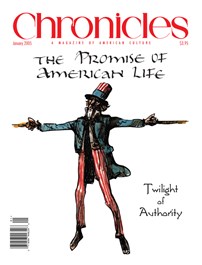Rockford, Illinois. After thirty-one years at Chronicles Magazine—thirty of them as editor—classicist, poet and polemicist Tom Fleming has retired.
During his tenure at this small but influential magazine of the paleoconservative right, which was founded by Polish emigre Leopold Tyrmand but turned into a real magazine by Tom, he published political and social commentators that varied from the Agrarian-minded Mel Bradford to the analyst of power that was Sam Francis, to the more humorous libertarian Bill Kauffman. He also published many men of letters: Wendell Berry, John Lukacs, George Garrett, Jorge Luis Borges, Andrew Lytle, Walker Percy, and Russell Kirk, to name a few.
In recent years the magazine’s readers have enjoyed regular contributions from Clyde Wilson, James O. Tate, Philip Jenkins, Roger McGrath, George McCartney, Frank Brownlow, Claude Polin and several others—a solid group who made the magazine interesting. Former Chronicles senior editor for books Chilton Williamson, whom Tom hired away from National Review in 1989, succeeds him.
Tom’s legacy will be, first, a publication that was willing to put its editorial hand on “third rail” political topics (such as massive immigration) when other magazines simply ducked. Anyone really interested in free political speech, be you on the right or left, should appreciate his courage. Secondly, he created a political magazine that was interested in the wider culture and in art, in way many political journals and sites are not, or not seriously. To give one example: the poetry published under Tom’s tenure (edited in recent years by poetry editor Catharine Savage Brosman) has been uniformly good—making the magazine the only one in America guilty of that.
Tom’s Chronicles never made the mistake of thinking politics was the sum of life, or even its center. It has been “a magazine of American culture,” and one that has been willing to celebrate what we can in this late Roman age of ours.
Though he will continue to write for the magazine, Tom has his own site at www.fleming.foundation, where he has already begun blogging. I’m told another book of social criticism is in the works, and I hope he will find a publisher for his own excellent poems. Good luck and Godspeed to him.





16 comments
Thomas Fleming
I want to thank my old friend and colleague Kate Dalton Boyer for her kind remarks. They are the more welcome as they are undeserved. I hope that she will join Ray Olson and other friends in writing for our website and for various print projects we hope to get off the ground in the near future.
robert m. peters
This is an opportunity for me to thank Dr. Thomas Fleming in his capacities as President of the Rockford Institute, as editor Chronicles Magazine and as a person who has over the last ten years encouraged me to write even as he knows that my skill needs a lot of work before I can “run with the big dogs,” if ever.
I have been privileged to attend portions of the Rockford Institute’s summer schools which Dr. Fleming and his staff have organized. I have read and kept ever issue of Chronicles over the last ten years, using many of the articles in my teaching.
I look forward to Dr. Fleming’s website and to the continued good work of the Rockford Institute and Chronicles Magazine.
Art Deco
This is rather grotesquely amusing. You’re now reduced to refusing to post my remarks, referring to Thomas Fleming’s manifest defects as signs of ‘courage’, pretending you don’t know that advocacy of the Serb cause was a signature of Chronicles‘ editorial line (or, perhaps, preparing a preposterous argument that Fleming was an advocate of the Serb cause without being an advocate of Milosevic in particular), and, now, pretending to instruct me on my manners, as if you were in any position to and as if that were the issue here.
I’m sorry you’re teaching the young, Dr. Polet.
Jeffrey Polet
Again, readers are free to go online and judge for themselves the charges concerning Milosevic, and whether, if true, they discredit everything else Mr. Fleming ever said. In my own judgment, Mr. Deco has distorted Mr. Fleming’s arguments, but I’m no expert on the issue. Mr. Deco had been given the freedom to state his claims (without accompanying evidence, I might note), but I can’t see how allowing him the freedom to belabor the claims is amusing, grotesquely or otherwise. I do, however, find turning the issue into a referendum on my teaching to be quite amusing. If Mr. Deco has something new to add to the conversation he is, of course, welcome to do so.
Jeffrey Polet
[Editor’s note] I have tried to contact Mr. Deco via email about subsequent postings pursuing the same line of responses. Unfortunately my email was returned, so I invite Mr. Deco to email me at polet@hope.edu to engage in conversation over posting etiquette and content. In any case, interested readers can perform their own online searches to determine for themselves the charges concerning Milosevic, and may want to take this opportunity to review Mr. Fleming’s writings for signs of vitriol. No doubt Mr. Fleming was an impassioned writer with finely honed ideas who was not afraid to take a stand on a variety of important issues, not least the American war machine. Such passion is bound to make enemies but also, as Kate indicates, is a sign of courage.
Art Deco
” Mr. Deco’s responses haven’t really engaged Kate’s article but have instead been little more than a continuous ad hominem. ”
That word does not mean what you think it means. (And I might point out that the individual actually subject to ad hominem remarks has been yours truly, the coward who uses a pseudonym).
That aside, it was a tribute to a particular person. I’m pointing out what anyone who read Chronicles should know, which is that the tribute fails to take into account aspects of what he’s done all these years and what sort of perspective he actually has advanced. You’d all rather not acknowledge that and you’re reduced to bald lying (Olson pretending Dr. Fleming never wrote a word about Serbia) and diversions (a mess of phony babble about my ‘discourtesy’ ‘cowardice’ ‘trolling’, etc). People of character do not do that.
Art Deco
” To Mr. Deco, I must say that in the nearly 20 years I have known him, I have never heard Tom Fleming approve of Milosevich, much less write him “mash notes”; and I share Ms. Dalton’s displeasure with your hiding behind a pseudonym, which I regard as the first sign of moral cowardice on the web.”
In the nearly 20 years you knew him, you never read his magazine.
I use only one handle, and all my remarks on sites like this make use of that handle. It was not chosen to please you.
Jeffrey Polet
While we don’t encourage the use of pseudonyms, we’ve always allowed them. It’s possible, after all, that a person might have compelling reasons for using one, although trolling isn’t one of them. Mr. Deco’s responses haven’t really engaged Kate’s article but have instead been little more than a continuous ad hominem. I don’t know the source of Mr. Deco’s animosity to Mr. Fleming, nor do I care. I suggest we leave personal attacks aside and deal instead with the substance of Kate’s essay, and celebrate Mr. Fleming’s important achievements. (ed.)
Ray Olson
Dr. Fleming has asked me to contribute remarks on the movies to the new website. I’ve begun with the post, “Reading for the movies: A. I. Bezzerides”. I hope to be a more frequent contributor than I have been to the Chronicles blog, but as a still active reviewer for Booklist, where I was on staff for 26 years, an active committee member at Twin Cities Friends Meeting, a landlord, and a gleefully active grandfather, things do pile up. To Mr. Deco, I must say that in the nearly 20 years I have known him, I have never heard Tom Fleming approve of Milosevich, much less write him “mash notes”; and I share Ms. Dalton’s displeasure with your hiding behind a pseudonym, which I regard as the first sign of moral cowardice on the web.
Art Deco
“Mr. Deco, may the affection you feel toward an old friend never meet with the same discourtesy (and by pseudonym) that you have shown here.”
My old and affectionate friends never wrote mash notes to Slobodan Milosevic.
If you’re all for courtesy, how did you manage to stomach the vitriol he tossed around from time to time?
Art Deco
“Dr. Fleming is a great scholar and a formidable man. ”
He wrote three books over a period of thirty years. That would not be unusual in a humanities department in a research university, few of whose denizens would describe themselves as ‘great’ scholars. (While we’re at it, The Politics of Human Nature is not a great book).
the sick joke which is American politics
And Dr. Fleming’s public commentary made it just a wee bit worse than it otherwise would have been.
JD Salyer
Dr. Fleming is a great scholar and a formidable man. Now that he no longer has to devote attention to the sick joke which is American politics, perhaps he’ll have time to produce some more books.
Josh
Best wishes to Dr. Fleming. I have gained much from reading Chronicles.
He is always insightful on politics, but it will be a good thing if Dr. Fleming can spend time offering commentary on more important topics. As he develops his new website, I look forward to lively discussions on literature, community, and family life.
Katherine Dalton
Mr. Deco, may the affection you feel toward an old friend never meet with the same discourtesy (and by pseudonym) that you have shown here. In any case I wish you peace.
Art Deco
Given that his successor is nearly 70, you think the talent pool at the Rockford Institute might be a tad shallow?
Art Deco
The curious aspect of Chronicles was that Fleming managed to recruit engaging contributors even though he himself was given to asinine and intemperate statements. (Leopold Tyrmand’s widow offered in 2002 that her husband would have been aghast at what Fleming had done with the publication, doubtless thinking of the contributions of Samuel Francis and Llewelyn Rockwell or perhaps Fleming’s own efforts as press agent for bloodthirsty Serb particularists).
Comments are closed.